

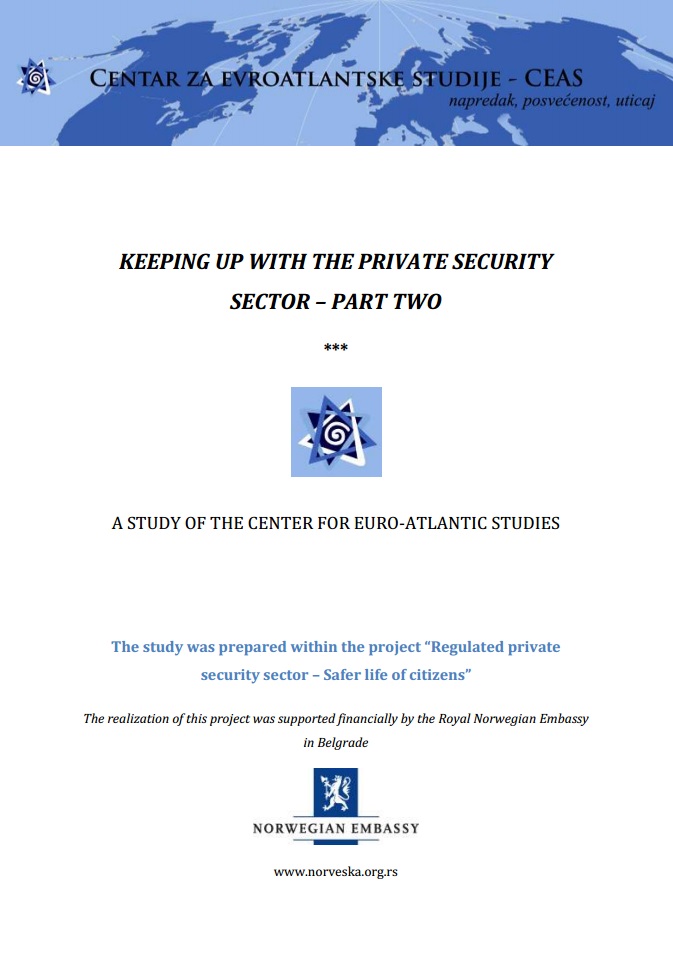
Study Keeping up with the private security sector – II, is a part of the continuation of the project “Regulated private security sector – Safer life of citizens” implemented by the Center for Euro-Atlantic Studies from Belgrade (CEAS) with support from the Embassy of the Kingdom of Norway in Belgrade.The goal of this project, which was implemented in cooperation with the Private Security Association with the Serbian Chamber of Commerce, is to exert public pressure on the government representatives to include the situation in this important and large economic and security area, as well as its legal regulation, among their priorities, by using all available methods of public advocacy, namely: publication of research; organizing public debates; discussions with representatives of the proposers of laws and regulations; interviews with the deputies; consultations with experts; consultations with the representatives of professional associations; consultations with civil society and through media appearances.Study “Keeping up with the private security sector – II” contains two analyses: Training and licensing in Private Security and Incompatible Activities of Members of the Ministry of the Interior with activities of private security. The first is primarily focused on the process and legal solutions that regulate training and licensing in private security, as well as all formerly adopted secondary legislation acts, and provides an overview of conclusions and recommendations. The second analysis addresses the issue of incompatible activities of police officers against the activity of private security. It analyzes the normative framework in which this issue is regulated, and provides an overview of conclusions and recommendations.
More...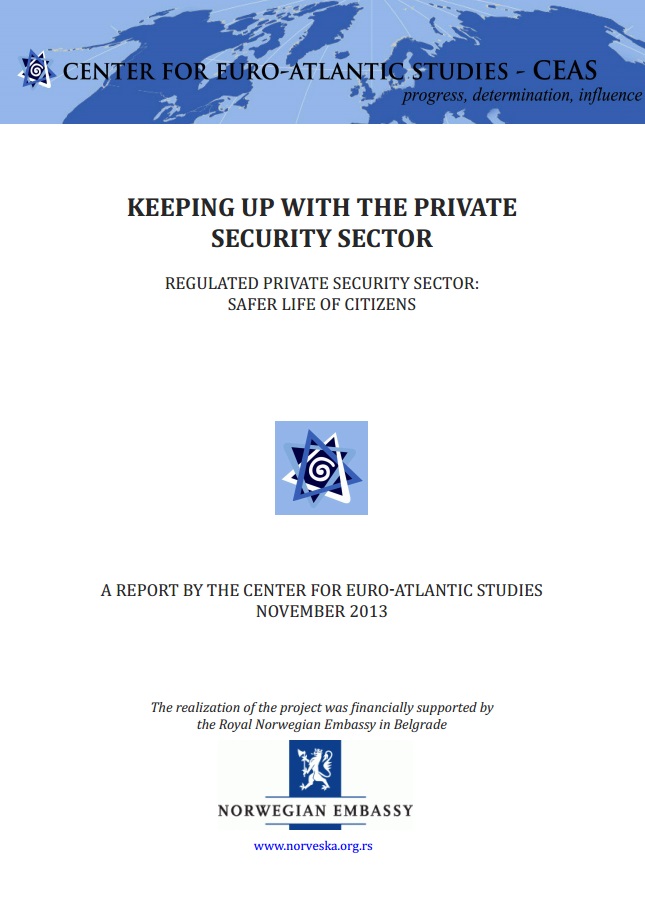
The Center for Euro-Atlantic Studies from Belgrade (CEAS) published today its new report "Keeping up with the private security sector", as a final part of the project "Regulated private security sector - safer life of citizens", supported by the ROyal Norwegian Embassy in Serbia.One of the purposes of the project was to influence representatives of the authorities to thoroughly review the existing state in this field and its place legal regulation of it among their priorities, through a campaign of public advocacy.
More...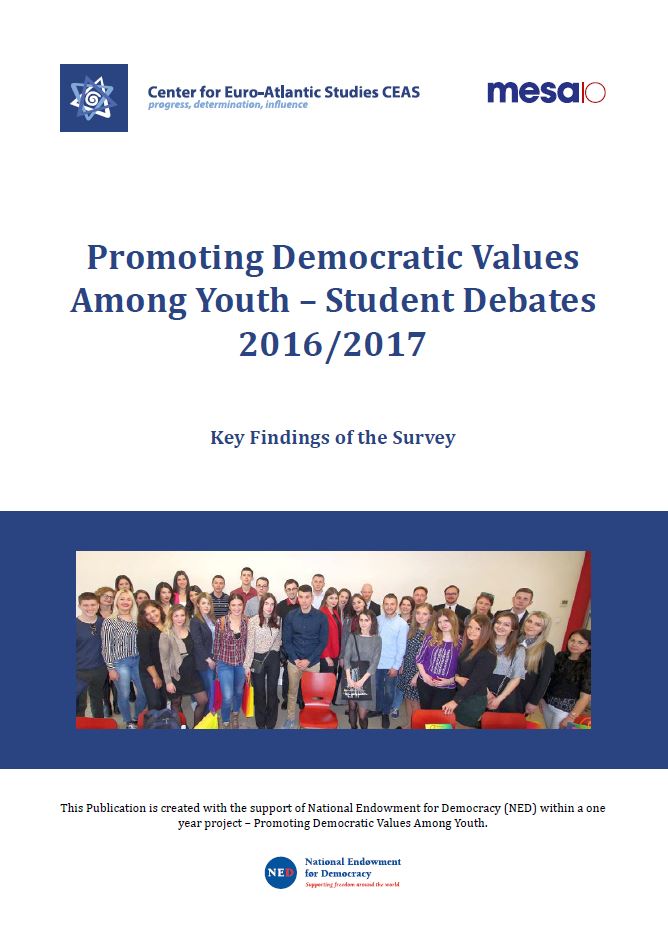
Keywords: Democratic Values; Youth; Student Debates; European Union; NATO; Populism; extremism
From October 2016, MESA10 from Bratislava, Slovakia and Center for Euro – Atlantic Studies(CEAS) from Belgrade, Serbia implemented fourth round of Student debates, a projectimplemented with the support of National Endowment for democracy from USA. We continuedto work with two universities from Serbia (the University of Belgrade and University of NoviSad) and two from Slovakia (Comenius University of Bratislava and Matej Bel University ofBanska Bystrica) as partners for the project. The project expanded to include a university from: Bosnia and Herzegovina (International University of Sarajevo), from Montenegro (University ofMontenegro) and from Moldova (Academy of Economic Studies of Chisinau).
More...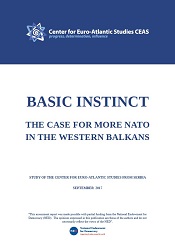
Keywords: Western Balkans; NATO; EU Global Strategy; Berlin Process
Multiculturalism presents democratic challenges. Even if enacted with the best intentions,say, to stop a bloody war, ethnic divisions embedded in state foundations multiculturalismcan further polarization and politicization of ethnic identities manifested in political, social, and economic systems through poor governance, suppression of individual liberties,corruption, and cronyism.
More...
Keywords: universal values; critical thinking.
The surveys were undertaken at seven universities located in five countries (Bosnia and Herzegovina, Moldova, Montenegro, Serbia and Slovakia). In November 2017, 1791 students were polled. Surveys are part of a University Students Debates’ project aimed at promoting universal values and principles through independent and critical thinking. The project is implemented jointly by MESA10 (Slovakia) and CEAS (Serbia).
More...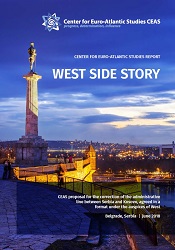
Keywords: Serbia; Kosovo
CEAS proposal for the correction of the administrative line between Serbia and Kosovo, agreed in a format under the auspices of West
More...
Keywords: Serbia; global security; Kosovo; European integration
Analiza nacrta Strategije odbrane Republike Srbije.The new strategic documents of the Republic of Serbia (RS) are being considered and adopted in a very dynamic period of global security and political trends. At the same time, the RS is also facing numerous unusually large internal challenges, from the need to reform the judiciary to the need to normalize relations with Kosovo. Both external and internal circumstances objectively make it difficult to adopt well-articulated strategic security and defense documents of a relatively small country in the relatively uncertain process of European integration and negotiations with Pristina, which it is conducting with the international community. Both reports, the analysis of the draft of the National Security Strategy (NSB) and the draft of the Defense Strategy (SO), under the umbrella title of Kosovo, are first of all structurally the same - the political and detailed normative context is analyzed first, followed by a qualitative analysis of the new drafts, a comparative analysis of the proposed drafts with existing legislation, and finally conclusions and recommendations.
More...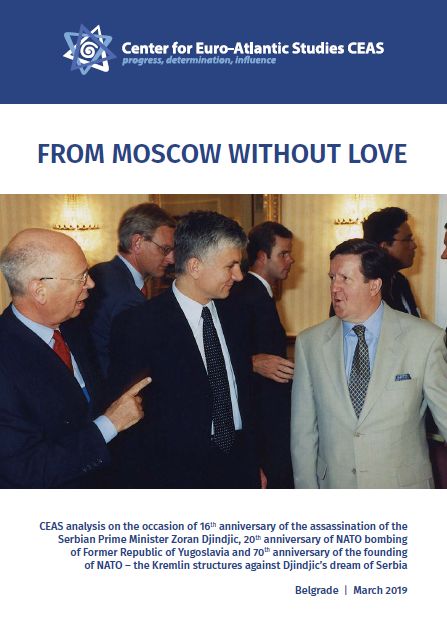
CEAS analysis on the occasion of 16th anniversary of the assassination of the Serbian Prime Minister Zoran Djindjic, 20th anniversary of NATO bombing of Former Republic of Yugoslavia and 70th anniversary of the founding of NATO – the Kremlin structures against Djindjic’s dream of Serbia.
More...
From Serbian and Russian trolls factoriesto pro Serbian and Russian governments mainstream media. Defamation and intimidation campaignagainst CEAS and it’s director Jelena Milic.The Center for Euro-Atlantic Studies (CEAS) from Belgrade has dealt with inaccurate or malicious reportingand commenting on our work in Serbian public space ever since its founding in 2007. This is notsurprising given that we deal with extremely sensitive issues, such as the causes and consequences ofNATO bombing of the Federal Republic of Yugoslavia; the murder of soldiers in Topčider and Leskovac;advocating Serbia’s membership in NATO; advocating prosecution of war crimes before domestic courtsand conducting other mechanisms of transitional justice, emphasizing the obligation and importanceof cooperation with the ICTY; encouraging normalization of relations with Kosovo and regional cooperation;comprehensive reform of the security system and its placement under democratic control.
More...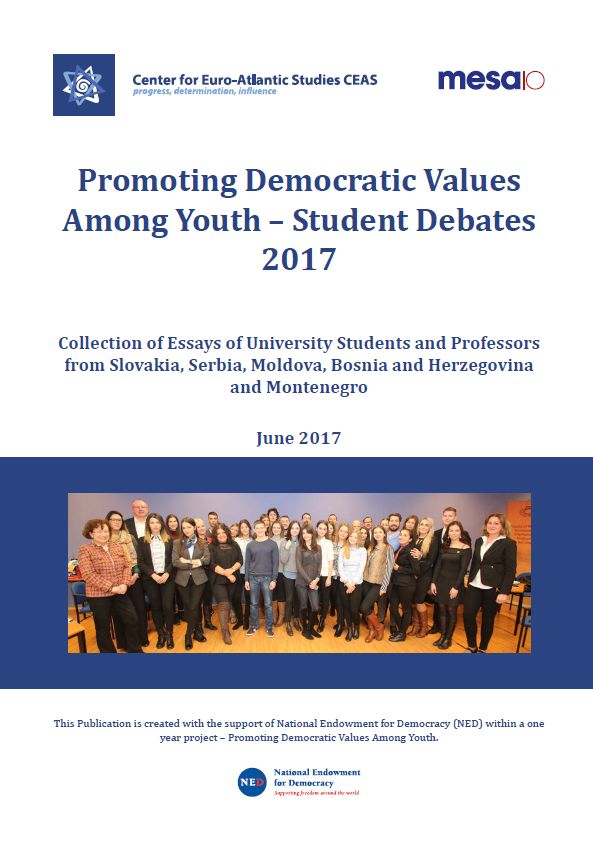
Collection of Essays of University Students and Professors from Slovakia, Serbia, Moldova, Bosnia and Herzegovina and Montenegro.In 2017 MESA 10 organization from Bratislava, Slovakia in partnership with Center for Euro-Atlantic Studies (CEAS) from Belgrade, Serbia implemented fourth round of Student debates, aproject implemented with the support of National Endowment for democracy from USA.The project aims at promoting democratic values, strengthening debating skills and ncouraging independent and critical thinking among university students from Slovakia, Serbia, Moldova,Montenegro and Bosnia and Herzegovina. Activities of this project included: two rounds ofthe debates among 35 students from participated universities, one in December 2016 heldin Slovakia and one in April 2017 held in Belgrade; tailor made online lectures by expertsin various fields aiming to help students to prepare for the debates; survey collected at theparticipating universities on the topics of NATO and EU integration, Russia and its efforts toinfluence Balkan countries; Current security threats; political situation in the EU, etc. andpublishing of the results of the surveys in a form of online and printed handout at the twopresentation events one to be held in Podgorica (Montenegro) and other in Chișinău (Moldova);and presentation of publication with the essays on the debate topics, composed by universitystudents and professors.
More...
Center for Free Elections and Democracy (CeSID) and Center for Euro-Atlantic Studies (CEAS), BelgradeNovember 08, 2018
More...